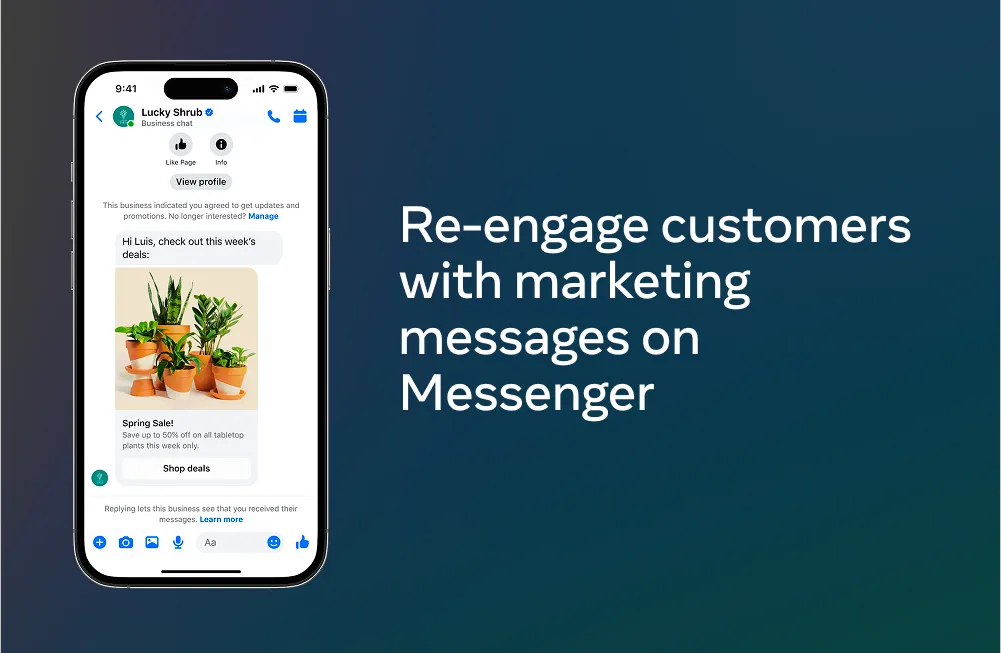Meta is sharpening its focus on messaging-driven commerce with the launch of enhanced marketing messages on Messenger. This revamped feature is designed to help brands re-engage customers more effectively through direct, personalised messages, building on past efforts while bringing in new levels of control, measurement and targeting.
The update reflects a broader shift in digital engagement, as messaging apps play a larger role in customer journeys. Messenger already has over a billion monthly users globally, and Meta is positioning it as a key re-engagement channel, especially in markets where mobile-first behaviours dominate.
What’s New With Marketing Messages
The original version of Meta’s re-engagement messaging has been available through the Messenger API for some time. However, the new marketing messages feature adds several important upgrades, including:
-
Customised Outreach: Businesses can now use their existing CRM lists to segment and send messages tailored to specific user profiles. This includes the ability to sub-segment lists with tags for more granular targeting.
-
Personalised Messaging at Scale: Brands can choose to send freeform messages to individuals or broadcast a single message to a larger audience, depending on campaign goals.
-
Click-to-Message Integration: These messages can work in tandem with Click-to-Message ads, making it easier to tie outreach to broader ad campaigns.
-
Advanced Metrics: Meta has introduced new reporting tools, such as cost per delivered message and cost per message link click, with more down-funnel tracking promised in H2 2025.
The messages can be used to promote products, highlight special offers or re-engage users who have previously interacted with the business via Messenger. Meta emphasises that users must opt in to receive these messages, which is essential to avoid spam concerns and ensure relevance.
Managing Frequency and Consent
Marketers should note that Meta is capping usage to one marketing message per day per unique user. This daily limit is intended to prevent overuse and protect the user experience, which is especially important given how private messaging channels are perceived compared to public social feeds.
The opt-in requirement is also non-negotiable. Only users who have explicitly subscribed to receive updates via Messenger can be targeted. This permission-first model aligns with Meta’s broader push to retain user trust while still offering performance-focused tools for advertisers.
It also means that list building is now a more strategic concern. Marketers will need to invest in subscriber acquisition through CRM integration, Click-to-Message campaigns and organic opt-ins across their owned channels.
Developer Access and Market Availability
The marketing messages capability is now available to developers globally through the Marketing API. However, business access is currently limited to select countries, including:
-
Australia
-
Brazil
-
India
-
Indonesia
-
USA
-
UK is notably not yet included
Brands planning to onboard must also configure Facebook Login for Business, update their UI to support subscriber management, and integrate new webhook notifications. Meta’s developer guidance includes these technical prerequisites, ensuring that agencies and partners can build messaging tools on top of the platform.
Replacing Recurring Notifications
This launch coincides with the planned deprecation of Meta’s Recurring Notifications feature in January 2026. The new marketing messages are being positioned as the successor, offering similar benefits but with more refined controls and business-friendly integrations.
While the daily message cap is stricter than Recurring Notifications, Meta is betting on better personalisation and performance tracking to deliver more value per interaction. The shift also reflects a growing maturity in the messaging ecosystem, where scalable engagement must now coexist with user experience and regulatory expectations.
Strategic Implications for Marketers
Messenger’s role as a customer service channel is well established. The opportunity now is to evolve that relationship into something more commercially dynamic. With these marketing messages, brands can continue conversations beyond the first sale, bringing in product discovery, offers and reminders that drive repeat purchase and retention.
Used thoughtfully, this could support a lifecycle marketing approach that links chat engagement to long-term value. However, marketers will need to be disciplined with content strategy and targeting. The intimate nature of messaging demands relevance, poorly timed or generic outreach will lead to unsubscribes or worse, negative sentiment.
The introduction of down-funnel metrics should help here, giving teams better insight into the commercial impact of message campaigns and how they fit within wider marketing objectives.
One-to-one at Scale
Meta’s renewed push into messaging reflects a larger trend in digital marketing: one where personal, permission-based engagement becomes the engine for retention and growth. With enhanced marketing messages on Messenger, the tools are there to build one-to-one relationships at scale. The challenge now is using them with care, creativity and strategic intent.
Marketers should start preparing now by reviewing opt-in flows, integrating CRM systems and aligning messaging with broader brand goals. Those who act early will be better placed to build a competitive edge in this increasingly conversation-driven landscape.




RECOMMENDED FOR YOU
Meta Taps Publishers to Power AI Outputs
Meta has re-entered the news licensing space with a…
Meta has re-entered the news licensing space with a…
Meta Launches AI Support Hub on Facebook and Instagram
Managing account issues on Facebook and Instagram has long…
Managing account issues on Facebook and Instagram has long…
Meta Adds New AI Tools To Supercharge Lead Gen
Meta is rolling out a wave of updates to…
Meta is rolling out a wave of updates to…